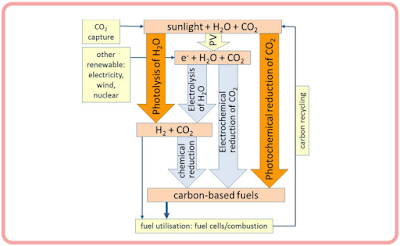Carbon Dioxide Utilisation (CDU) is a topic of growing interest around the world and as reported earlier a CO2 Forum panel on 'Impacts, Policies and Strategies of CDU' took place on September 15 in conjunction with the four-day International Conference on Carbon Dioxide Utilisation (ICCDU) in Sheffield, UK. The ICCDU is now organised as an annual event in response to the growing interest CDU in the academic community. ICCDU 2017 will take place in Shanghai. The CO2 Forum enjoyed a high level of representation from industry with presentations and participation in the debates from companies including Covestro, Carbon8, Total, 3M, and Sunfire.
The high level of debate was reinforced by the presence of delegates from the
IEA and
IASS Postdam. In addition several partners from the
SusChem supported SCOT project were also present and discussed the conclusions and recommendations of their project.
This year, the CO2 Forum was truly international with the participation of a some US delegates sharing views and highlighting additional and currently less known up scaling projects such as
Skyonic in the US and
CarbFix in Iceland.
CDU (or #useCO2) approaches are a medium to long-term research and innovation priority of SusChem and are featured in the
SusChem Strategic Innovation and Research Agenda (SIRA). SusChem inspired #useCO2 calls have been included in Horizon 2020 work programmes including those developed through the SPIRE PPP such as SPIRE calls
05-2016 and
08-2017.
Economic issues
Although more #useCO2 projects are being announced, the economics of CO2 valorisation remains a significant issue in the current conditions. More incentives and support schemes are needed to support technology development and demonstration of CDU technologies at the large scale.
Pierre Barthelemy, Executive Director Research and Innovation at Cefic participated in a panel debate at the CO2 Forum and highlighted the need for support across all Technology Readiness Levels (TRLs), in particular financial support is needed beyond TRL 7 (defined as 'system prototype demonstration in operational environment' under Horizon 2020). He also called for an appropriate regulatory framework that supports #useCO2 business cases.
Inevitably the discussion at the CO2 Forum also included the potential for Carbon Capture and Storage (CCS), however the slow development of this technology was highlighted. By 2025, CCS projects currently in the pipeline could capture only 10% of what is required to support the
two degree scenario (2DS) discussed at COP21 in Paris. Clearly no technological option should be rejected and more innovation is needed to meet the challenge of climate change.
Club CO2 seminar
The technical and economic issues around #useCO2 projects will also be the subject of the
second CO2 reuse seminar organised by
ClubCO2 with the support of
ADEME and the
CO2Forum. This event takes place on 21 October 2016 in Lyon, France and will focus on the question: What are the economic and environmental benefits of CO2 reuse? The first ClubCO2 seminar was organised in Le Havre in May 2015, Club CO2.
The morning session (to be conducted in English) will present the current position and prospects for the policy-making, regulatory and economic aspects of CO2 reuse and analyses of the economic and environmental benefits of different CO2 conversion processes, based on industrial applications.
The afternoon parallel expert sessions will be organised in English and French speaking workshops with the aim of discussing and highlighting the conditions for the successful emergence of CO2 transformation technologies.
You can find
more information about the Club CO2 seminar here and
registration for the event can be found here.
The
ADEME (French Environment and Energy Management Agency) founded
Club CO2 in 2002 with the support of the
IFP Energies Nouvelles (IFPEN - formerly French Petroleum Institute) and
BRGM (Bureau of Geological and Mineral Research). Since 19 March 2016, Club CO2 has been a non-profit association registered under French law to bring together industry and research organisations in this area.











